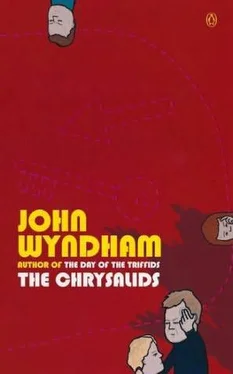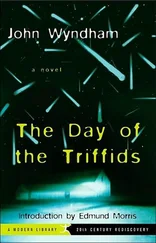My father was a man of local consequence. When, at the age of sixteen, he had made his first public appearance by giving a Sunday address in the church his father had built, there had still been fewer than sixty families in the district. But as more land was cleared for farming and more people came to settle, he was not submerged by them. He was still the largest landowner, he still continued to preach frequently on Sundays and to explain with practical clarity the laws and views held in heaven upon a variety of matters and practices, and, upon the appointed days, he administered the laws temporal, as a magistrate. For the rest of the time he saw to it that he, and all within his control, continued to set a high example to the district.
Within the house, life centred, as was the local custom, upon the large living-room which was also the kitchen. As the house was the largest and best in Waknuk, so was the room. The great fireplace there was an object of pride — not vain pride, of course; more a matter of being conscious of having given worthy treatment to the excellent materials that the Lord had provided: a kind of testament, really. The hearth was solid stone blocks. The whole chimney was built of bricks and had never been known to catch fire. The area about its point of emergence was covered with the only tiles in the district, so that the thatch which covered the rest of the roof had never caught fire, either.
My mother saw to it that the big room was kept very clean and tidy. The floor was composed of pieces of brick and stone and artificial stone cleverly fitted together. The furniture was whitely-scrubbed tables and stools, with a few chairs. The walls were whitewashed. Several burnished pans, too big to go in the cupboards, hung against them. The nearest approach to decoration was a number of wooden panels with sayings, mostly from Repentances, artistically burnt into them. The one on the left of the fireplace read: ONLY THE IMAGE OF GOD IS MAN. The one on the right: KEEP PURE THE STOCK OF THE LORD. On the opposite wall two more said: BLESSED IS THE NORM, and IN PURITY OUR SALVATION. The largest was the one on the back wall, hung to face the door which led to the yard. It reminded everyone who came in: WATCH THOU FOR THE MUTANT!
Frequent references to these texts had made me familiar with the words long before I was able to read, in fact I am not sure that they did not give me my first reading lessons. I knew them by heart, just as I knew others elsewhere in the house, which said things like: THE NORM IS THE WILL OF GOD, and, REPRODUCTION IS THE ONLY HOLY PRODUCTION and, THE DEVIL IS THE FATHER OF DEVIATION, and a number of others about Offences and Blasphemies.
Many of them were still obscure to me; others I had learnt something about. Offences, for instance. That was because the occurrence of an Offence was sometimes quite an impressive occasion. Usually the first sign that one had happened was that my father came into the house in a bad temper. Then, in the evening, he would call us all together, including everyone who worked on the farm. We would all kneel while he proclaimed our repentance and led prayers for forgiveness. The next morning we would all be up before daylight and gather in the yard. As the sun rose we would sing a hymn while my father ceremonially slaughtered the two-headed calf, four-legged chicken, or whatever other kind of Offence it happened to be. Sometimes it would be a much queerer thing than those….
Nor were Offences limited to the livestock. Sometimes there would be some stalks of corn, or some vegetables, that my father produced and cast on the kitchen table in anger and shame. If it were merely a matter of a few rows of vegetables, they just came out and were destroyed. But if a whole field had gone wrong we would wait for good weather, and then set fire to it, singing hymns while it burnt. I used to find that a very fine sight.
It was because my father was a careful and pious man with a keen eye for an Offence that we used to have more slaughterings and burnings than anyone else: but any suggestion that we were more afflicted with Offences than other people hurt and angered him. He had no wish at all to throw good money away, he pointed out. If our neighbours were as conscientious as ourselves, he had no doubt that their liquidations would far outnumber ours: unfortunately there were certain persons with elastic principles.
So I learnt quite early to know what Offences were. They were things which did not look right — that is to say, did not look like their parents, or parent-plants. Usually there was only some small thing wrong, but however much or little was wrong it was an Offence, and if it happened among people it was a Blasphemy — at least, that was the technical term, though commonly both kinds were called Deviations.
Nevertheless, the question of Offences was not always as simple as one might think, and when there was disagreement the district’s inspector could be sent for. My father, however, seldom called in the inspector, he preferred to be on the safe side and liquidate anything doubtful. There were people who disapproved of his meticulousness, saying that the local Deviation-rate, which had shown a steady overall improvement and now stood at half what it had been in my grandfather’s time, would have been better still, but for my father. All the same, the Waknuk district had a great name for Purity.
Ours was no longer a frontier region. Hard work and sacrifice had produced a stability of stock and crops which could be envied even by some communities to the east of us. You could now go some thirty miles to the south or south-west before you came to Wild Country — that is to say parts where the chance of breeding true was less than fifty per cent. After that, everything grew more erratic across a belt which was ten miles wide in some places and up to twenty in others, until you came to the mysterious Fringes where nothing was dependable, and where, to quote my father, ‘the Devil struts his wide estates, and the laws of God are mocked.’ Fringes country, too, was said to be variable in depth, and beyond it lay the Badlands about which nobody knew anything. Usually anybody who went into the Badlands died there, and the one or two men who had come back from them did not last long.
It was not the Badlands, but the Fringes that gave us trouble from time to time. The people of the Fringes — at least, one calls them people, because although they were really Deviations they often looked quite like ordinary human people, if nothing had gone too much wrong with them — these people, then, had very little where they lived in their border country, so they came out into civilized parts to steal grain and livestock and clothes and tools and weapons, too, if they could; and sometimes they carried off children.
Occasional small raids used to happen two or three times a year, and nobody took much notice of them as a rule — except the people who got raided, of course. Usually they had time to get away and lost only their stock. Then everybody would contribute a little in kind, or in money, to help them set up again. But as time went on and the frontier was pushed back there were more Fringes people trying to live on less country. Some years they got very hungry, and after a time it was no longer just a matter of a dozen or so making a quick raid and then running back into Fringes country; they came instead in large, organized bands and did a lot of damage.
In my father’s childhood mothers used to quieten and awe troublesome infants by threatening: ‘Be good now, or I’ll fetch Old Maggie from the Fringes to you. She’s got four eyes to watch you with, and four ears to hear you with, and four arms to smack you with. So you be careful.’ Or Hairy Jack was another ominous figure who might be called in ‘… and he’ll take you off to his cave in the Fringes where all his family lives. They’re all hairy, too, with long tails; and they eat a little boy each for breakfast every morning, and a little girl each for supper every evening.’ Nowadays, however, it was not only small children who lived in nervous awareness of the Fringes people not so far away. Their existence had become a dangerous nuisance and their depredations the cause of many representations to the Government in Rigo.
Читать дальше












